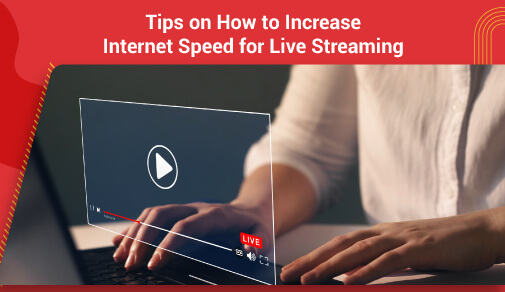Tips on How to Increase Upload Speed for Live Streaming
-
481
-
08 Jun 2024
-
4 minutes

Today, we have to communicate, entertain, and share information using live streaming. Whether you are a Twitch gamer, YouTube vlogger, or a webinar host, a professional, stable, and fast Internet connection is essential for the best Internet providers for streaming. Your upload speed is one of the factors that will determine the quality of your live stream. This article will discuss what a good internet upload speed is, why it is crucial, the requirements of upload speeds on platforms, and some practical tips for increasing your upload speed for live streaming.
What Is a Good Upload Speed for Streaming?
The best bandwidth limits will depend on the resolution and platform in use while using the best internet providers for streaming. Higher data rates enable better video viewing quality and smoother videos for viewers. What is the recommended upload speed for streaming? Read below!
Standard Definition (SD) 480p: This requires roughly 3 Mbps.
High Definition (HD) 720p: Needs around 5 Mbps.
Full High Definition (FHD) 1080p: Needs at least 10 Mbps.
Ultra High Definition (UHD) 4K: Requires approximately twenty to twenty-five megabits per second.
Why is Upload Speed Important for Streaming Live?
Live streaming relies heavily on upload speed because it dictates how quickly information gets sent from your device to servers used by the platform for streaming. Low internet speed for live streaming may cause buffering issues, lagging, or poor video quality that can greatly affect how viewers see live videos. And this is why:
Quality Maintenance: With the best internet connection for live streaming come higher visual resolutions and better audio quality, which, when combined, create better visuals.
Stability: Consistently uploaded speeds ensure that there are no interruptions between streams due to download buffers.
Interactivity: The responsive interaction with chat rooms or question-answer sessions goes smoothly when one stream has minimal lags caused by high-speed net delays.
What Is the Upload Speed Required for Different Video Platforms?
Now, if you've been wondering things like, "What is a good internet upload speed?" Different platforms have different requirements regarding what kind of internet connection you need if you want to broadcast streams with a certain quality. Let's now look at some popular platforms and their best internet connection for live streaming:
Twitch: If you want to stream at 720p and have good quality, you need an upload speed of at least 6 Mbps, according to Twitch. Around 10 Mbps is preferred for 1080p.
YouTube Live: YouTube recommends between 2 -5 Mbps for uploading a video of 720p, between 5-10Mbps for a video of 1080p, and between 20 -51Mbps for streaming in 4K.
Facebook Live: Facebook requires at least 4 Mbps when one wants to broadcast on it in high definition with a resolution of about 720 pixels and about 10 Mbps if you choose to use the option that has a higher quality (1080 pixels).
How to Increase Upload Speed for Live Streaming?
What can you do if your internet speed for live streaming does not meet the requirements?
1. Upgrade Your Internet Plan
The simplest way would be upgrading your internet service plan to increase broadband upload speed from your ISP.
2. Use a Wired Connection
Ethernet usually offers more stable connections that are faster than Wi-Fi. Doing away with Wi-Fi as a means of connecting devices could help reduce latencies.
3. Optimize Your Network
Limit Bandwidth Usage: Ensure that no other gadgets on your network take up too much bandwidth by pausing downloads, updates, or streams on these devices.
Close Background Applications: To free up some data transfer capacity, kill unnecessary applications running in the background while streaming.
4. Update Network Equipment
Modem and Router: Old hardware might not allow fast internet speeds, but buying a new modem and router may significantly increase your upload speeds.
QoS: Some advanced routers have quality service settings whereby you can prioritize some types of traffic, such as live streaming, thus guaranteeing that these are granted enough bandwidth.
5. Optimize Streaming Settings
Adjust Bitrate: By reducing your bitrate, your upload speed will not be overloaded. You have to test different conditions to find a middle ground between quality and performance.
Frame Rate and Resolution: Consider lowering the resolution or frame rate if you face problems while streaming.
6. Check for Network Interference
Make sure other electronics or physical barriers do not interfere with your wifi signal. This problem may be solved by changing the channel on which your router works.
7. Consult Your ISP
Sometimes, the problem lies with the ISP. Contact them to ensure that you are getting the speeds you pay for and to find out whether there are any network issues or throttling policies.
8. Use Network Optimization Tools
There are various software tools out there that help optimize your network settings, thereby improving its overall efficiency.
Conclusion
One should always strive to maintain a quick and stable upload speed to succeed in live streaming. Since every platform has specific requirements regarding its users' uploading speed, one must know them all and look for opportunities to increase this parameter as much as possible, whether it means upgrading your internet plan, switching to a wired connection, optimizing your network, or customizing streaming settings. Numerous methods can be used to enhance the quality of watching media on such platforms. This will provide the best upload speed for live streaming standards that will keep viewers glued to their screens all day long without growing tired of it.






